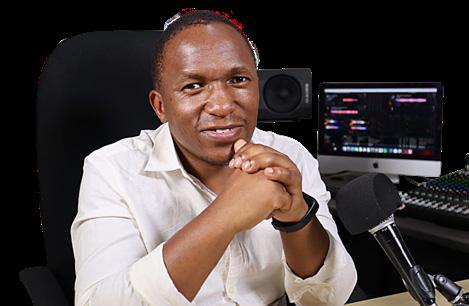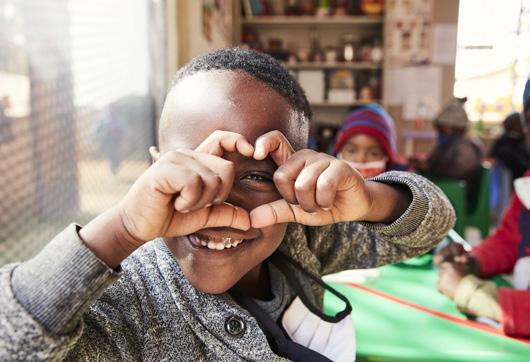




With a Nedbank Stokvel Account, you can do the following:
• Get discounts of up to 10% on groceries and school supplies.
• Get R10 000 funeral cover at a monthly premium of R25 per stokvel member.
• Earn great interest rates when saving through a Stokvel Account.
Not only that, but you can easily make payments into your Stokvel Account at a Nedbank Intelligent Depositor ATM or via electronic funds transfer or debit order.
So, do you want a bank that takes your money, or a bank that takes your money seriously?
Open an account today and add members easily by dialling *120*001# or visit a Nedbank branch.






The word ‘stokvel’ is understood to originate from the term ‘stock fair’, as the rotating cattle auctions of English settlers in the Eastern Cape during the early 19th century were known. But contrary to popular belief, the group-saving method is not limited to Mzansi, but found across Africa.
Stokvels have evolved since the 19th century. According to the National Stokvel Association of South Africa (NSASA), the stokvel market, which is largely informal, is worth US$3 billion. This edition rightfully zooms in on the topic of stokvels, as we are right in the thick of the holiday stokvel season, where members that have painstakingly been saving throughout the year finally get their pay-outs. In this issue, we speak with stokvel giant Busi Skenjana, who is the CEO of BSK Marketing and the founder of the Stokvel Academy. Our cover lady has a relentless passion for stokvels and, in our feature, she speaks about the importance of education in the stokvel industry as well as how the group-saving method is undervalued by government.
Our stokvel conversation
continues as we speak to the founder of United Africa Stokvel, Darren Langbein. He speaks to Spot-On about digitising stokvels, which minimises the physical exchange of hard cash that puts a lot of stokvel members in danger.


As much as we’re highlighting the stokvel market and its impact in this issue, we also have the spotlight on one of Tshwane’s townships, Mamelodi. Google’s predictive search suggestions might offer ‘Sundowns’ as you type ‘Mamelodi’, but there is much more to this township than the defending Premier Soccer League champions. We speak to renowned, multitalented poet MoAfrika wa Mokgathi, who is a globally recognised artist born and bred in Mams.
multicultural. That’s what makes party people,” MoAfrika fittingly
Empowering and Educating the community, we speak to a young lady, Nkeletseng Tsetsane, who is the brand director of Cuffed Urban Street Wear. The Mamelodi clothing brand gives skilled former ex-convicts an opportunity to make Cuffed clothing from scratch.
Other great reads in this edition include the story of Tidimalo MoeletsiMashigo, founder of Tidi’s Kitchen in Mamelodi, and our profile of Kasi Business Hub, a group of young guys who promote local businesses through an app and social media. It is a packed issue that should keep you entertained through the December holidays.
As this is our last edition for 2022, we’d like to thank all of our readers for the year we’ve had. It’s been a tumultuous one for us as a country when you look at Eskom’s troubles – and the instability of multiparty coalitions in the various municipalities hasn’t inspired a sense of calm in communities.
We hope you have a great and safe festive period with your loved ones. And remember to support local business these holidays!
The National Stokvel Association of South Africa defines a stokvel as a credit union in which a group of people enter into an agreement to contribute a fixed amount of money to a common pool weekly, fortnightly or monthly. Contrary to popular belief, this system is not unique to Mzansi.
In Kenya, a stokvel is also known as a chama. Originally, chamas tended to be exclusively women’s groups, but as they started to grow in sophistication and success, men started participating in chamas as well. In Kenya, there are estimated to be 300 000 chamas managing a total of KSh300 billion (US$3.4 billion) in assets.

In South Africa, there’s a sense that stokvels are undervalued or are simply seen as a pastime for black women in the township. “Stokvels are not fully appreciated and valued by corporate South Africa, as they are perceived to be a group of informal savings groups, who are just consumers of goods,” Busi Skenjana, CEO of BSK Marketing, tells Spot-On The financial challenges of the last few years have highlighted the importance of saving. “Indeed, the Covid-19 crisis and many other economic challenges should have taught many people – including stokvels – the importance of emergency fund savings,” says the stokvel giant Skenjana.
There aren’t many people with the knowledge, experience and passion for stokvels that Skenjana boasts. Her organisation, BSK Marketing, is a below-the-line strategic agency with over 25 years’ marketing experience, focusing on stokvels throughout South Africa. Through BSK Marketing, Skenjana launched Stokvel Academy in 2017 as a way of educating people about this form of saving. Stokvel Academy is a division of BSK Marketing.
“Stokvel Academy and BSK Marketing access as many stokvels as possible through different touch points. On average, we engage with about 25 000 stokvel community members per annum. The number of stokvel community members reached depends on our clients’ and sponsors’ needs,” says Skenjana.
The Stokvel Academy offers two types of stokvel learning platforms – the first being the Stokvel Workshops, supported by specific brands. “While we market brands, we also use that as a platform to educate stokvels.”
There is also the Stokvel Academy Learning Management System. This is an online-based learning platform hosted on the website: www.stokvelacademy.co.za. “This is a fairly new platform, where we teach the basics of stokvels, as well as financial education supported by a panel of accredited financial experts.”
Skenjana concurs with Spot-On when probed on how stokvels generally don’t take seriously the importance of getting an education in stokvels. “Indeed, stokvels seem to downplay the importance of formal education, especially financial education.
“Stokvel Academy’s mission is not to formalise stokvels, but to harness and nurture stokvels so that they can reach their financial freedom potential, and hopefully create generational wealth.”
It doesn’t help that the South African government isn’t tapping into individuals
Stokvel Academy’s
to formalise stokvels, but to harness and nurture stokvels so that they can reach their financial freedom potential, and hopefully create generational wealth.”
like Skenjana who have the expertise to make a big difference in communities. “Unfortunately, Stokvel Academy does not work with government at this stage due to government’s lack of structured focus on stokvel development.
“In my view, stokvels can a play a key role in government’s economic development policy framework. If stokvels could be nurtured and supported, they could play an important role in business development and poverty alleviation, through job creation.”
There is a stigma attached to stokvels: many believe they are solely for black women in rural areas and townships. This assertion isn’t helped by the fact that one of the most popular stokvels is for groceries, which is dominated by females. “That is a perception. The older black women who dominate stokvels joined in their youthful stage. For instance, I am 66 years old; I joined my first stokvel when I was 24. I am still a stokvel member in 2022. There are many older black men and women who have been in stokvels for decades,” Skenjana says.

“The youth are fairly active in the newgeneration stokvels. They may not be calling them stokvels, but the principles are similar to older-generation stokvels. The young stokvel generation is more focused on wealth creation activities like property investment.”
team members: ensure that you join a stokvel with people who are credible, trustworthy and can reasonably afford to meet their stokvel financial commitment.
Set clear goals for your stokvel: the goals must be specific, measurable, achievable, relevant and time based.
All stokvel members must commit to the stokvel vision.
You must have your customised constitution.
Always engage with financial advisors from recognised and credible financial institutions.
You must have huge appetite for learning, especially financial education.
Be willing to invest in holistic stokvel development: you must strive for health-related, financial and social wellness.
You must have a clear and sustainable savings plan: this plan should take your stokvel into the future – not just for December sharing!
Stokvel leadership is key: your leader/s should be able to lead the stokvel into a wealthy future.
joining mass social media stokvels (e.g. on Facebook and WhatsApp)!
mission is not
It’s common knowledge that peer influence often starts to overshadow parental influence as a child grows, but the strength of good families continues to play an important role in shaping adolescents’ development. Having a solid family background with positive relationships is associated with lower levels of adolescent depression and delinquency.
Selekolo was adopted by his aunt and uncle because they did not have children of their own. “My aunt was a family-oriented person; she always came up with solutions in the family and was a peace mediator even in the extended families. So, being such a solutionoriented person, she came up with an idea of selling cold drinks, beers and snacks in order to boost the household income. She was not an entrepreneur per se –she was simply helping her family to live. Little did she know that she was planting a seed within me because I was given the responsibility to make sure that the stock was enough in the fridge, the profit is set
“They adopted me and my girl cousin. I was four years old when they took us in. My parents have always been around, literally 30 minutes away from Ledig where I was raised, and I would visit them during school holidays.”
In 2004, when Selekolo was in grade 9, his aunt suggested that he take the family camera with him to a school excursion, to make some money.
school trip with friends? he laughs. “But I did it anyway, and I’m glad I did. Because, from that school trip, I made some money for me and the family, I learned a bit about business, the entrepreneurial seed was planted, I learned to work and interact with people, I learned a bit about the photography business and more. So, it was worth it.”
Selekolo was born in Molorwe, a village in the North West, and grew up in Ledig near Rustenburg.
Selekolo is only 32 years old but his experience in business belies his years. In 2017, he founded 2kay Photography, which specialises in events photography and private photoshoots. In 2020, a few weeks into lockdown, Selekolo co-founded Rahisi Online with a friend. “The business sells website and learning management systems at a subscription rate. So instead of paying R9 000 for website, you simply pay R299 per month,” he says.
He looks up to entrepreneur and entertainer DJ Sbu as one of his inspirations. “For a boy who grew up reselling cold drinks and years later seeing another kasi boy manufacturing his own cold drinks is somewhat mind-blowing, and I cannot help but embrace and support him.”
Last year, Selekolo established Mswenko Sneakers, which was officially launched in October this year. “We make and sell feelgood sneakers that are stylish, comfortable and convenient in a way that you can wear them for sport and casually,” says the young entrepreneur.



For every pair of Mswenko Sneakers bought, Selekolo has committed to donating R10 to charity as a way of giving back. “We identified Inkateko Project Orphanage Centre based in Ivory Park. Our customers will see how their R10 makes a difference when they follow us on social media. We are planning to donate every three months; so, at the end of January 2023, we will visit the centre. While doing so, we will share the photos and experience with our customers on social media,” says Selekolo. Looking to the future, he says, “I see Mswenko having grown to expand its impact in the customers’ hearts through

Serial entrepreneur Kabelo Selekolo is living proof of how a strong family foundation can set one up for a life of self-sustenance
the creation of the most affordable, convenient and stylish sneakers. And charity wise, my biggest ambition is to be able to cater for five charities per province (45 charities) every three months.”
In his years of business, during which he has founded nine different ventures, Selekolo says his two biggest lessons have been around focus and being knowledgeable about the field you’re in. “It’s really hard to focus when you have multiple things going on in your life. You have to focus on one business, master it, grow it to a point where it can run itself at least,” he says.

“You need to be at the top of your game regardless of what you do in life; if you’re an athlete, for example, you need to keep learning about body functions, human physiology, healthy diet, the history of sport, previous sportspersons who’ve succeeded and why. One has to immerse themselves in the information linked with their industry/ field. By so doing, you will be ahead of your counterparts because, with the information you have, you can constantly operate your business by making informed decisions.”
Each venture comes with its unique challenges but, after being in business for a decade, one learns the ebbs and flows of operating a company, regardless of the type of business. “Having an idea for
business is very exciting because what comes to mind is money and success – which can be true. But the real deal is what happens between the idea and the success, which is when one really decides whether or not they want to stick around,” says Selekolo.
“Some of us who decide to stick around experience things like bad marketing – when the message is not well communicated to potential customers, sales not coming in, not finding the right people to work with, etc. If you start with limited capital, like I did, I became a one man show responsible for everything from graphic design to social media admin, sales management, marketing, deliveries, etc., which is obviously tiring and frustrating. But everybody starts somewhere!”
INSPIRED TO MAKE A POSITIVE IMPACT Selekolo is inspired by two commitments he made to himself: making his family’s life easier and making the community he comes from a better place. “I want to cut the chain of ‘lack’ in my family. I want to create a generational financial freedom for my family,” he says.
“There’s a saying, ‘If one of us is not free, we are all not free.’ Our communities are important in building a great society that we live in; we were raised in these communities, as our children will be. But it’s important that we do not neglect them as we grow and move to towns. I want to help through any means I have to support and uplift disadvantaged communities.”

South Africans speak a home language other than English.

South Africa is experiencing a literacy crisis: currently, 78% of 10-year-old children are unable to comprehend and understand what they are reading. South Africa ranked last out of 50 countries in a Progress in International Reading Literacy (PIRLS) study. In fact, according to the recently released Reading Panel report, at the current rate of progress, it will take almost 80 years before 95% of grade 4 learners in the country are able to read for meaning – the year will be 2098.
These concerning statistics have crucial implications for South Africa’s future generations. Research states that if a child is unable to read by 13 years of age, they are likely to drop out of school, which then results in implications for the child’s future and the well-being of generations to come. This issue is further exacerbated by the fact that – in a country with 11 official languages – mother tongue language books are not part of the mainstream, nor are they readily available.
Only 2% of children’s books published commercially in South Africa are in local African languages, even though 80% of
While English-language books featuring Eurocentric narratives are readily available, they lack cultural context enabling children of various backgrounds to identify with the stories they are told. According to the South African Constitution, everyone has the right to use the language and to participate in the cultural life of their choice. Moreover, studies also support that language diversity in literature creates smarter, happier children who are more likely to succeed later in life.

Ethnikids, an online children’s bookstore producing books in all 11 official languages, has partnered with Wimpy in an edutainment initiative to increase literacy levels in South Africa. This initiative gives children access to an African folktale collection of books in their home language, enabling them to embrace their rich cultural heritage while providing them with the opportunity of reading diverse material that they can relate to and identify with.
With the widest selection of inclusive children’s books in South Africa, Ethnikids, founded by five moms, specialises in providing children with diverse, multicultural, multilingual content and tales that represent the Rainbow Nation’s melting pot.
“We have a literacy crisis in South Africa – many
children are not showing any interest in reading and, after years of searching for books with characters that look like our children, it worried us that many children’s narratives were being excluded. It’s important for children’s self-image to relate to what they read, to understand more about other cultures and to breed tolerance,” says Khumo Tapfumaneyi, co-founder of Ethnikids.
Ethnikids has produced a new multilingual and multicultural folktale collection that encourages diversity, inclusion and literacy among South Africa’s children.Tina Akuok and Khumo Tapfumaneyi, founders of Ethnikid s
“To spark a love of reading, we need to provide children with material that they can identify with; they need to see people that look like them in the stories they read,” she adds.
South Africa has a rich heritage of storytelling traditions where history and cultural ethos are handed down from generation to generation. Maintaining language and traditions through literature enables this heritage to be preserved for future generations, with the ritual of storytelling and cultural folktales underpinning the values of society.
“These books will offer children a myriad of cultural values such as identity, quality time with their families through reading, learning about other cultures, and helping to build their confidence – all while maintaining and preserving their home language,” adds Tapfumaneyi.
Following the success of the partnership launched last year, a new collection of books has been written based on five different South
African folktales. The aim is to capture South Africa’s rich heritage of stories in these imaginative children’s books while inspiring a love of reading.
This year’s initiative further encourages children to engage with the stories by including an interactive online experience. Children can choose their own ending by scanning a QR code at the back of the books using their own imagination to expand on the narratives.
The books are available online in all 11 official languages, as well as in Khoekhoe/ Nama. They can be downloaded, together with MP4 recordings of the stories, at https://wimpy.co.za/kids/mzanzi-stories.

English books are available at Wimpy restaurants with a kids’ combo meal. Says Jacques Cronje,
marketing executive, Wimpy: “We are passionate about igniting a love of reading and it’s important that we create a sense of pride in who we are and where we come from in a way that children are familiar with.”


With stokvels in sharp focus in this issue, Spot-On chats to Finlite CEO Andile Fulane about the importance of education in the stokvel trade.
What are some of the financial literacy programmes you deliver and how are they structured?
They are normally workshop based, where we invite groups into a central venue that is closest to them. The sessions are often sponsored by insurance companies, banks and retailers that then make them freely accessible to stokvels.
What are some of the biggest mistakes people make when establishing their stokvels?
They get into stokvels with people they don’t know and don’t trust, which eventually leads to conflict. There is also a lack of good recordkeeping and some don’t use the appropriate bank account for the stokvel.
Do you think stokvels themselves undervalue their own potential?
Absolutely. Because they lack some of the basic financial education skills and vision, they don’t realise how much they can achieve.
Finlite is a financial sector training and mentorship organisation that uses cutting-edge technology to create a lasting impact on clients’ lives. Their mission is to create rural and township-based wealth managers who will bridge the knowledge and solutions gap most black communities need to thrive. They have been working with informal groups like stokvels, burial societies and communities through financial literacy programmes and key partners to impart the right knowledge on the public.
There seems to be little to no involvement from government when it comes to stokvels. How much of an impact would government involvement have in stokvels’ impact in people’s daily lives?
The government considers stokvels as informal savings groups and therefore exempts them from registering as a financial organisation. But there is some progress. For instance, the Financial Sector Conduct Authority (FSCA) now offers licences to stokvels in order to sell financial products. It’s a big step in the right direction, especially to those stokvels that are well led.
At the Township Retail Investment Summit, you spoke about corporates not understanding the nature of stokvels. Yet it’s the same banks where stokvels save their money. Do you think corporates disregard stokvels and their potential?
There is no effort to understand stokvels beyond them being just consumers because it means they can continue using their money to grow the sector but not offer stokvels what they deserve. They benefit from the ignorance or lack of financial literacy.
You launched a social investment fund to provide bursaries for youth in financial services and free financial literacy courses in
2020. Do you provide funds for aspirant students who want study something in financial services at any institution in SA or this is limited to those receiving their education from Finlite?
No, the bursary is only for our own internal courses to train more black financial planners to serve our communities with financial intelligence and integrity.
What does the future of stokvels look like?
There’s a very slow shift into digitising stokvels but because most of them are made up of the older generation, which is not so tech savvy, it’s going to take time. Our objective is to get millennials to see stokvels as a method of organising capital and creating opportunities for themselves – like how Kenya’s economy is largely running from stokvels called SACCOs, which have grown to be mini-banks and miniinsurance companies.
Finlite Stokvel Revolution podcast hosted by Palesa Lengolo, is available on YouTube, Spotify and Google Cast. +27 (0)87 223 0647
Finlite Financial Education https://finlite.co.za andile@finlite.co.za info@finlite.co.za
One of the things that Covid-19 accelerated in society was the value entrepreneurs place in their digital presence. Establishments who never bothered to have a social media page or website before Covid were forced to rethink their ways because of the potential of doing business online.
Kasi Business Hub is an entity that assists entrepreneurs to grow their businesses digitally, especially start-ups. “We are an online business platform, and we aim to do kasi business apps (township business directory apps),” Themba Khumalo tells Spot-On

He is one of the three founders and directors of the Kasi Business Hub – the others being Prince Mathebula and Juvie Morena. The three individuals are entrepreneurs in their own right: Morena runs the NeoTino online store, while Mathebula is a professional cameraman who owns mobile carwash Buffer Wash. Khumalo is the owner of app development and marketing company Zulu Systematic.
Kasi Business Hub was founded in November 2019 but officially became a business in June 2020, in the middle of Covid-19. “Everything we’ve done so far is directly from our own pockets – no sponsors, no grants. It has not been easy, but we keep pushing and make no excuses. Our first app so far is MAMSLiNK – an app for Mamelodi businesses,” says Khumalo.
The MAMSLiNK app is available for download and gives one access to numerous businesses in the Pretoria township, which is especially helpful to someone not familiar with the township. “We will be making more township business apps for other townships, such as Tembisa,
Soweto, Thabong, Gugulethu, etc. in the next few years,” Khumalo says.
Khumalo adds that they currently don’t charge businesses to be placed on their app nor do they charge businesses for the promotion they do on their Facebook page. “We do have a price list of starting packages on our website.”
Their packages are broken down into three categories: Bronze, Gold and Platinum. Their services range from company registration to social media, website creation and management, and Google search optimisation.

Kasi Business Hub is very passionate about the township economy and making a tangible difference in society. “In the past two decades, we have been seeing a lot of malls in townships and these malls do not help the start-up township businesses, as it’s too expensive to rent a store in them,” says Khumalo.
“With our apps, we aim to help township businesses to be on an online platform and
this
How a company is helping to bring kasi businesses beyond their borders into the digital future.
Darren Langbein is the founder of United African Stokvel and has been an entrepreneur for the past 10 years in the property and financial industries. We chat about bringing stokvels into the 21st century.
Langbein has extensive experience in management roles and recently transitioned into the Fourth Industrial Revolution. Since 2017, he has launched three new start-ups in the telecommunications, investment and non-profit sectors. His passion for making a difference in people's lives is what drives the types of projects he takes on.
In this Q&A, Langbein speaks to Spot-On about the work being done at United African Stokvel, which is a safe and reliable, communitybased savings stokvel where they help individuals save for their future, together. With their various affordable saving plans, they assist you to save your money and earn highly competitive compound interest rewards on your savings.
What prompted the idea to digitise stokvels?
I love the concept of people doing things together in the space of the Fourth Industrial Revolution. I am very attracted to the concept of people trusting each other, especially in this day and age.
United African Stokvel seems to be champions of modernising this old-age group-saving method. With stokvels often being dominated by the older generation, has it been easy to convince them to save their money digitally instead of holding cash
because of their scepticism towards new tech?
When we first started, it was exceptionally difficult to get people to trust us. Now that we are approaching our fourth birthday and have so many successful savers having been paid out, we are in a position where we have grown our members' trust and are growing exponentially.
What’s the average age of your members? I assume that they’re old?
No, that is very incorrect! We appeal to all age groups. We firmly believe it is never too early or too late to start saving.
It’s that time of the year when stokvels come into sharp focus, but also a period when criminals are most active. Would you say digitising stokvels is the safer option?
Absolutely! There is no cash swapping between hands and there is a digital trail of all savings deposits and pay-outs. Digitising stokvels is the only way forward in terms of security.
How much of an assistance has social media been to your business?
Social media is vital. We have tried all advertising avenues and social media is the most effective.
You’ve gone from having to defend your brand from being called a scam in your first year to having your members defend you in your third
year. How valuable is the trust you’ve built with your members?
Our stokvel is nothing without the trust and support of our members. Our members are the single most important part of our stokvel.
How many members does United African Stokvel have to date?
We have over 15 000 members and are growing daily!

Can a person use your platform to save as an individual or must they be part of a group?
You can save as an individual or as a group. We structure savings plans to suit your needs!
How important would you say saving is, especially in these financially challenging times?
Saving is especially important these days as it creates a positive mindset. When you actively save money on a monthly basis, you start to become particularly careful on how you spend your money. This is the hidden gem in saving money – you become exceptionally careful with your unnecessary expenses.
unitedafricanstokvel info@uasv.co.za 083 264 9115 https://uasv.co.za




Stokvels are helping millions of South Africans leverage the power of regular saving to survive in a harsh economic climate – and Nedbank is at their side.
The end of the year is always a tough time financially; all the expenses of the festive season are quickly followed by the demands of the back-toschool crowd. And let’s not forget how many South Africans are unemployed, adding to the burdens.
In true Mzansi style, South Africans have their own, long-established and highly practical response: stokvels. Stokvels, or savings clubs, have been around for generations, and create mini communities in which like-minded people can meet regularly to socialise and support each other in keeping up their monthly contributions. Stokvels are wildly popular because they work on so many levels.
Many see stokvels as an important counterweight to South Africa’s
undeveloped savings culture. Figures show that the country’s household savings rate declined to a worrying low of 0.2% in the second quarter of 2022. By contrast, stokvels demonstrate just how valuable consistent saving can be.
“South Africans are notoriously poor savers, which impacts the economy as a whole as well as families’ ability to ride out tough times. As we saw during the Covid lockdowns, stokvels helped many people to survive the catastrophic loss of income,” says Sisandile Cikido, head: Retail Investments at Nedbank. “Because of their key role in building financial stability and advocating for savings, Nedbank has developed savings products specifically designed to help stokvels access extra benefits and give their members a little rocket fuel.”
Nedbank’s stokvel account offers many advantages. There are no monthly maintenance fees, and the interest earned is based on how much is in the account. Funds are immediately accessible. Members with a Nedbank PAYU account can receive their funds immediately and securely.
Each member under the age of 65 is eligible for the R10 000 burial cover benefit for a low premium of R25 per month. Another benefit is a discount of up to 10% on groceries or school
supplies when shopping at selected Nedbank partner stores.
“Discounts are becoming ever more crucial in the current cost-of-living crisis,” Cikido observes.
The bigger picture is that by opening a Nedbank stokvel account, the stokvel is able to realise the substantial benefits of digital banking. These include easy transfers to members and the ability to use USSD to open and manage the account, and add members to the funeral benefit. It also virtually eliminates the need to visit – and queue at –bank branches .
The last-mentioned benefit is more than just a convenience. During the lockdowns, unbanked stokvels could not collect and distribute money in person, while stokvels with Nedbank accounts were still able to receive deposits and make transfers.
“The proof of the pudding is in the eating, and South Africa’s stokvels are turning to the Nedbank stokvel account in growing numbers. More than 153 000 stokvel members are using us to maximise their savings, benefit from the advantages of digital banking, and score on the discounts and offers we negotiate for them,” she concludes. Make sure your stokvel gets all the benefits of Nedbank’s stokvel account – find out more and sign up by dialling *120*001#.

















South Africa’s thriving township economy, which employs around 17% of our working population and represents millions of rand in spending power, has been identified by leading global events company dmg events as a priority theme for next year’s portfolio of trade shows falling under the banner of Africa Trade Week 2023.
The many formal and informal businesses operating within the vibrant township economy range from manufacturers and traders to retail and hospitality establishment owners, all providing goods and services that meet the
wide range of social and economic needs within township communities.


The Township Development Act, which was signed into law in Gauteng by Premier Makhura earlier this year, is a sign of the importance placed by government on unlocking new procurement and market opportunities for township businesses. However, according to Evan Schiff, portfolio director at dmg events, there are many South African citizens who still do not understand what the township economy actually means, or how they can access it, or even benefit from it in a professional capacity.

We have partnered with dmg to bring the township economy pavilion to the dmg platform, in order to have greater access to market, funding and investment, as well as access to information sharing and a wide, international network. We feel that it is a great platform to develop business within the township economy.”
Bheki Twala,president of Township Economy Council South Africa
dmg events’ new advisory board is set to build solid foundations for sustainable economic growth.
“dmg events is a primary supporter of the township economy, which is why the upcoming Africa Trade Week 2023 – featuring Africa’s Big 7, SAITEX and the Hotel and Hospitality Show – will have a deliberate focus on the township economy,” says Schiff.



Earlier this month, dmg events appointed and convened with its new advisory board for Africa Trade Week 2023, which will take place on 18 to 20 June 2023. It will include 40 professional men and women working
within the township economy across the food, trade and hospitality sectors. The board came together to conduct a guided discussion that focused on the key issues facing township businesses and to identify new opportunities for growth through understanding the broader needs of this business community.
One of the primary challenges recognised by the group was access to finance. Board members recalled their own personal struggles with company debt and highlighted the need for expert guidance to better understand what is needed to qualify for finance, as well as
accessing the right type of finance according to a business owner’s unique situation.
Another issue discussed during the session was the challenge of accessing new equipment, and the upscaling of one’s business in order to compete with larger market players. Members also spoke of their interest in enhancing fundamental business skills such as marketing and product design, as well as the ins and outs of e-commerce and expanding into new markets.
Bheki Twala, president of Township Economy Council South Africa, says: “We have partnered with dmg to bring the township economy pavilion to the dmg platform, in order to have greater access to market, funding and investment, as well as access to information sharing and a wide, international network. We feel that it is a great platform to develop business within the township economy.”
Schiff adds: “In this modern world, we can’t do business alone – we need people and platforms to come together, to enable us to source the products we need and the customers we want. At dmg events, we build our shows around our buyers – and our newly appointed advisory board represents our buyers in the township economy and provides us with the strategic insight and guidance that ensures our content is relevant, topical and valuable. We are excited to play a pivotal role in propelling South Africa’s township economy to its full potential and look forward to a successful year in 2023.”
He explains PC Clinic SA’s services: “We specialise in different fields of IT but focused more on computer repairs and network installations. This includes laptop repair, screen replacement, network installation, telephone system, camera installation, data transfer and data recovery. We also do remote access work and assist clients online.”

Ribisi has identified an opportunity in other products around his business. He also sells
Istarted the business after realising that I’m actually having people knock at my door to get help with their laptops/ computers,” 29-year-old Ribisi tells Spot-On But he admits it was a friend who advised that he register a business in 2016, which is known as PC Clinic SA.
Ribisi is a trained IT technician. “I have a diploma in information technology and other IT certificates in computer hardware and software, including programming,” he says.
The best businesses are born when entrepreneurs identify a need for a service or product in their environment. This kind of attitude often determines the trajectory of the business, especially when the owner constantly spots opportunity.
Benny Ribisi from Mamelodi is an entrepreneur who identified a need for IT services in his community.
PC Clinic SA merchandise to his clients. “I do sell refurbished laptops and hard drives, routers and we also have some of our own brand merchandise (t-shirts, hats, beanies, hoodies, sweaters, tracksuit pants).”

The downfall of some businesses in the township is that they are run by talented or skilled individuals who undervalue education or some form of training, opting to wing it. It seems having formal training has also built trust with some of his clients, some of which are schools and people beyond Mamelodi.
“The biggest challenge is getting clients from the suburbs into Mamelodi. They don’t feel safe driving to Mamelodi, so I always have to drive to them instead,” Ribisi says.
He mostly works alone, at the moment, but ropes in assistants from time to time. “I have two technicians that work part time when we have installations,” he says.
As a business that works around electronics, PC Clinic SA is more susceptible to Eskom’s load-shedding than most. “Load-shedding really affects us. Sometimes clients can’t get their laptops on time because the power cut can go for four to six hours and the network towers will be off. Then we also can’t do any online work,” says Ribisi.
“Also, pricing is a challenge. I try to be affordable to assist those who can’t afford the services, especially the students,” he says.
This is one of the biggest challenges for businesses in the township, because they can’t charge as they’d like since unemployment and other social ills are rife in townships, so a level of consciousness is required when pricing.
PC Clinic SA operates from Ribisi’s home and doesn’t have rent expenses. “Sometimes I drive to clients if there’s a house call and I also have a few schools that I help with ITrelated problems,” Ribisi says.
“I want to see PC Clinic SA become one of the biggest IT businesses in South Africa, which provides solutions for businesses and government institutions. The business must be reachable,” he says.
“I also want to have different stores that sell electronics and do repairs in suburbs and
townships; I want a PC Clinic store that will sell different electronics. In a few years, I also want to see PC Clinic SA creating employment for the youth in townships.”
THE BASSIST Ribisi is an avid bassist and plays the instrument in his spare time away from the business. “I am in a church band full time and also play as a session bassist, as well as in studio recordings and live performances.


“Growing up in Mamelodi has taught me so much and has developed a strong character in me. I think it was God’s plan because I have spent most of my years in church and that has kept me away from a lot of destructiveness and kept me grounded,” says the young man.
“One thing I love about this township is the talent that is here – from sports to art – and that has helped me to discover my talents at a young age.”
FOR MORE
PC Clinic S.A info@pcclinicsa.co.za
Located on Mphela Street, Mamelodi, Tidi’s Kitchen has become one of the Gauteng township’s favourite restaurants since it was launched in 2020 by Moeletsi-Mashigo. “I started cooking when I was 11. I learnt that from my grandmother – she was one of the best cooks I have ever met,” says Moeletsi-Mashigo.
Like many South Africans, Moeletsi-Mashigo lost her job due to Covid-19 and decided to go into business and do what she loves and what she’s good at – cooking. The business has grown in the last few years thanks to Moeletsi-Mashigo’s consistency and passion. Just a peak into her social media pages will show you how much customers enjoy her food. She serves a variety of dishes – not only fast foods you’d come across on any

kasi corner. The Tidi’s Kitchen menu includes breakfast, a kids’ section and platters.


“They [customers] like our African cuisine, dagwood and our famous mix grill,” Moeletsi-Mashigo says.
Tidi’s Kitchen is open seven days a week and Moeletsi-Mashigo works with two employees on normal days, “But when we have events, we add six [people], depending on the event,” says the skilled cook.

Moeletsi-Mashigo doesn’t rent the space she operates in, as she works at her in-laws’ home. “Unfortunately, my husband passed away last year,” she says.
With Eskom’s load-shedding now seemingly a permanent fixture in South Africans’ lives, businesses have made peace with the blackouts. “Yey! It used to affect us a lot, but now we can work without Eskom, thanks to FREC,” Moeletsi-Mashigo tells Spot-On
“The love I saw in people when eating my food. Whenever and wherever I cook, people just love my food.” These are the words of Mamelodi’s Tidimalo Moeletsi-Mashigo, who shares the inspiration behind starting her business, Tidi’s Kitchen, with Spot-On .
FREC, the Ford Resource and Engagement Centre, is a microbusiness development centre that assists entrepreneurs.
It has supplied Tidi’s Kitchen with a generator so that the business operates offgrid. It just needs filling up with fuel.
Most townships around Gauteng experience an exodus of people who go ‘home’ during
the December holidays. This usually leaves most townships emptier than usual, which has a ripple effect on businesses. But true to her genius as an entrepreneur who thinks on her feet, Moeletsi-Mashigo has already planned for the upcoming holidays.
“We are planning on expanding our kitchen to Senotlelo, Mpumalanga,” says the businesswoman.






“There's a pub there where we saw the opportunity. Most of our customers are from Mpumalanga and Limpopo, and the place is between the two provinces – so we thought, since they are going home for the festivities and there’s no one who serves the kind of food that we are serving, why don’t we follow them and give our people what they love?”

Tidi’s Kitchen will operate at the pub in Senotlelo for a month, from 4 December until 4 January. But Moeletsi-Mashigo confirms that the Mamelodi restaurant will carry on operating throughout the holidays.

tidiskitchen 083 515 4377

Tshepo Maapi and his team won a Shark Tank type of competition aimed at helping contestants understand what is needed to start and run a business.
Maapi is the owner of Tawkkul convenience store based in Winterveld, a suburb of Mabopane in Tshwane. The store is located within a mosque compound and en route to four schools.

His initial winning idea was for an egg and chicken farm; however, given that the prize money was only R60 000 and the high cost of entry into the poultry business, Maapi and his teammates applied what they learnt during their year-long study at Regent Business School, instead pivoting towards a more realistic
business idea – and hence the convenience store was born.
This competition was initiated by Hoosen Essof, manager at redHUB, a specialised unit of Regent that focuses on entrepreneurship, which aims to equip students with 21st century employability skills, among other things.
Essof says Regent Business School facilitated funding of R60 000 through the help of the South African National Zakáh Fund (SANZAF), a non-profit organisation in Durban that also sponsored the students’ studies at the institution.
“I have also helped the students identify suitable premises, negotiate with the landlord, link them with potential suppliers, and advise
them on structuring their work (shifts) and business skills (daily recordkeeping),” he says.
Maapi says Samukeliso Mncubeshe, an entrepreneurship lecturer at Regent Business School, helped with all the business planning.
“From social media marketing to website design, Regent Business School went over and beyond educating me on the fundamentals in modern day business, especially when starting a new brand in the market.
“Mr Essof even helped in getting us placed at a large wholesaler in Tshwane, Advance Cash and Carry, so that we could learn the ins and outs of running a shop. That was a great learning for us,

A one-man business in the form of a townshipbased convenience store will be an essential supplier of everyday commodities for residents of a Tshwane community. This shop was an idea born out of a competition aimed at developing entrepreneurs at Regent Business School.
as the majority of their customers run township-based spazas and supermarkets. In fact, Regent Business School’s support till this very moment has been overwhelming. Words cannot express how grateful I am.
“I look forward to the Regent Business School bringing more opportunities such as this to young entrepreneurs,” he states.
Maapi says Winterveld is one of the more impoverished and underprivileged communities in Gauteng. Therefore, he is taking a ‘convenience store’ approach, which means he is not selling to monthly grocery shoppers but to everyday customers.

Having just started trading, Maapi says that he is discovering what his customers need and will adjust his stock accordingly.
He has not lost his ambition of owning a poultry farm in the future.
Since 1998, Regent Business School (RBS) has been at the forefront of premium management education across the continent. Headquartered in South Africa, RBS’s acclaimed business, finance and management programmes have helped individuals and organisations build and sustain competitive advantages in a rapidly-changing, complex business environment. With campuses in all major hubs of South Africa – including Durban, Johannesburg, Cape Town and Pretoria – as well as in SADC countries Swaziland and Namibia, the institution’s alumni base of 10 000 is rapidly expanding.
RBS’s leading centres for excellence – The Institute of Entrepreneurship, The Centre for Islamic Finance and Banking, and The Centre for Public Sector Administration Management and Innovation – are popular with high performers who are serious about making positive, impactful change within the global finance and management sectors. It’s latest Fourth Industrial Revolution innovation hub and academic makerspace, the iLeadLAB, is at the forefront of the institution’s strategy to empower students and stakeholders with in-demand skills as well as the hard and soft digital skills for the Fourth Industrial Revolution.
RBS has developed a series of programmes that are designed to provide students and organisations with the management competencies and critical skills necessary to build and sustain competitive advantages in a rapidly changing and complex business environment. RBS’s expertise has evolved through continuous research and development undertaken in delivering a range of local and international business and management education programmes.
As a specialised education and training provider of managementrelated learning programmes, RBS has the capacity, systems and resources to deliver courses with the flexibility of on-site, off-site as well as web-based teaching and learning.
It is well known that successful companies make deliberate efforts to ensure that the training of staff does not compromise production and business time. RBS delivers courses that are flexible and supported through a range of support facilities and services (i.e. telephonic support, face-to-face lectures, online and web support, and virtual classrooms). This strategy contributes significantly to placing partner organisations at the forefront of competitiveness, having their staff trained and uplifted while still maintaining optimal productivity.
Above all else, RBS takes great pride in providing its graduates with critical thinking and soft skills that empower them with well-thought-out insights into the theoretical and practical aspects of a rapidly changing external environment within which businesses are obliged to operate.
Regent Business School. Disrupt. Rethink. Innovate. www.regent.ac.za

Nkeletseng Tsetsane can’t recall how she found herself at the Youth Rehabilitation Centre in Krugersdorp where she came across talented young people that melted her heart. Tsetsane works closely with adolescents and young people addressing social ills through her social enterprise, MB Teen Lifestyle.
“One of the things that bothered me is that, in most sessions, I found that socio-economic circumstances were at the core of most, not all, of their bad choices and risky behaviours,” Tsetsane tells Spot-On
“The young people that I work with were mostly convicted under the Child Justice Act. There are inadequate after-care programmes to support them and ensure that they are able to earn an honest living in their endeavour to turn their lives around… I just wanted them to have a fair shot.”
Seeing this need, the Mamelodi lass decided to create opportunities for these ex-offenders through her clothing brand, Cuffed Urban Street Wear, in 2020.

“Honestly, launching was the easy part. Like most businesses, we did not think Covid restrictions would last as long as they did. We started to feel the pinch
towards the end of 2021 when we decided to close the physical store and only operate online,” says Tsetsane, who is the brand director.

The Cuffed Urban Street Wear team is a small one that includes graphic designer Tshepiso Mpofu, social media guru Connie Motseo and Mbali Masina, who is the Cuffed Urban Street Wear brand ambassador.
“The four of us keep the engine running, with each of us responsible for a different division. The stitchers come and go, as none of them are meant to be employees but rather incubated to pursue their individual dreams.”

A brand that makes it possible for those who have run afoul of the law to give meaning to and turn around their lives.Nkeletseng Tsetsane Brand ambassador Mbali Masina at the Cuffed Urban Street Wear shop at Kasi CoLab at Mamelodi Square
Tsetsane corrects Spot-On that these aren’t former criminals but young people who were dealt a heavy blow in their younger years. Tsetsane speaks passionately about creating opportunity for the ex-offenders who are skilled. “Language is very important… they are not called criminals. Either exoffenders or people who have been in conflict with the law,” she says.
The brand doesn’t necessarily hire these young men and women but offers some type of incubation, insists Tsetsane. “We assist them to register their business and get access to market through Cuffed Urban Street Wear. So, this means that we have a constant flow of those coming in and going out. We started with a group of eight, while others continue to pursue other opportunities. The eight were all trained on enterprise development through a beautiful partnership with the National Youth Development Agency (NYDA) Johannesburg branch. Some went on to be grant recipients while some pursued other opportunities, which we encourage,” says Tsetsane. The programme currently has three young people that are being prepared for training. “But we have also decided
to open the project up to other talented young people who have not been in conflict with the law. What is important is to see that young people – irrespective of their past mistakes or socioeconomic background – are given an opportunity to pursue their dreams in an economically viable manner using their talents,” she says.
A large portion of the Cuffed Urban Street Wear is made from scratch, bar small items such as bucket hats and other accessories that are storebought and branded. “Remember, the guys are stitchers and they make their money through the production of clothing pieces; if we had to buy and brand elsewhere, then they would have no income,” Tsetsane says.

“Over and above that, it keeps them busy… motivated because the excitement after production is out of this world! There are also valuable life lessons to be learned in the manufacturing process: time management, teamwork, conflict management and budgeting because they are essentially running their own businesses as they are paid for production.”
“The retail industry is really cutthroat – a lot of competition,” concedes the brand director. “I always say that we are not selling just clothes; we are selling young people’s dreams… we are giving them an opportunity to reimagine their lives in a practical and financially sustainable manner – that sets us apart.”
In the early days, they started production from Mahube in Tshepiso’s bedroom at home in Mamelodi. “We laugh every time we reminisce about those times. We now have a physical shop at the Kasi CoLab at Mamelodi Square. We formally launched on 27 October 2022 when the mall was officially opened.”
Their move to Mamelodi Square has been a great help for their production, as the shopping centre has a backup generator for when Eskom’s inevitable blackouts occur. “It was crazy, honestly, because – depending on the different stages –we lost a big chunk of production time. Fortunately, we now have a generator because we are at a mall.”
The day concluded with the KFC team members enjoying some KFC Mini Cricket fun and levelling the playing field against the learners present, with the children certainly holding their own with bat and ball.
The following day, Laerskool Westerlig in Danville, Pretoria West, made a big impression on both the KFC Add Hope team, as well as Titans cricket player Modiri Litheko.
Commencing the day’s proceedings, the school welcomed guests into their well-run kitchen, which feeds in excess of 200 learners daily. Following that was an extremely well received cheque for R105 000, handed to school principal Mr Erich Cloete.
The month of October was World Hunger Month and KFC in Pretoria was humbly reminded of the importance of the KFC Add Hope programme in the community.


On 20 October, the Add Hope team visited Kutumelo Molefi Primary School in Pretoria East, together with Doreen Gough, president
of Pretoria Sunrise Rotary Club, as well as Titans Ladies cricketer Nicolien Janse van Rensburg. The funding by KFC Add Hope contributes significantly to feeding the 2 200 learners daily.
In added celebration, Pretoria Sunrise Rotary Club received R113 000, distributing it to Kutumelo Molefi Primary School as well as two other local schools in need of the funds.
In a good run of form, the school’s KFC Mini Cricket team as well as Teachers’ Team dominated their match against the KFC visitors – an absolute perfect end to a perfect day for Laerskool Westerlig!
Closing out the month of October, the Add Hope team was hosted by the Viva Foundation at their Refilwe campus on Monday, 24 October. Viva Foundation provides primary school education to nearly 400 learners at two campuses, the second of which is located in
Every visit to a KFC Add Hope beneficiary is a stark reminder on how a little change can make big change and that the support given to the schools feeding programme is essential, appreciated and life changing.
Mahube Valley. In addition, they provide daily, nutritious meals to all the children, made possible by the Add Hope funding of R121 000 for the next year.
The visits were rounded off by a stop at the Whispers Speech and Hearing Centre. “Add Hope money is very strictly for food. So, we run our whole feeding programme, which is two cooked meals a day and two snacks a day for the children that are here the whole




day. So, it literally goes to cover all food the children are eating – from breakfast they eat in the morning, a snack at 10:00, a full-cooked lunch at lunchtime, and then the children who only go home at 17:00, we need to feed them again later in the afternoon, so they have another snack again in the afternoon,” said Whispers principal Brenda Schmid.
Ofentse Ranoto, coordinator for Titans Mini Cricket, was present to give the kids and




KFC staff some lessons in the gentleman’s game. “We’ve been visiting a couple of beneficiaries around Pretoria and adding mini cricket to the good work they [KFC] have been doing.”
The saying goes, “A hungry child cannot learn,” and the KFC Add Hope programme is thankful to all those schools that understand this. It looks forward to continuing to support them in the future.
Mamelodi is one of the cultural hubs of South Africa. It is here that you can come across talented jazz artists jamming at a hangout spot, gifted writers exchanging ideas while unwinding, or just some young people enjoying the liberty of youth at social gatherings known as diSocial, which play the most thumping house music.
“Mamelodi is a boiling pot of energy, culture – it’s so multicultural. That’s what makes it unique. We’re known as the party people,” MoAfrika shares with Spot-On MoAfrika, whose real name is Muriel Mokgathi-Mvubu, is a renowned writer and artist born and bred in Mamelodi East, Section 14.


Mamelodi and the greater Pretoria’s multiplicity can probably be described well by MoAfrika wa Mokgathi’s words: “Re bana ba Tshwane, fela ga re tshwane,” which means, “We’re children of Tshwane, yet we’re not all the same.”
“I’m moulded by the landscape and the soundscape of Mamelodi. I love jazz music.
Mamelodi is full of jazz music and that somehow was embedded in me growing up here,” says the 35-year-old.

“It was a very lovely childhood upbringing; the home was a happy one. We didn’t have silver and gold, even though my grandfather worked at the South African Post Office and my grandmother was a kitchen lady. What I can say is that we never went to bed hungry, and for me that was a good childhood,” says the creative MoAfrika describing her childhood in Mams.
MoAfrika is respected for her work throughout the world, but it was her grandfather and uncle who laid the foundation. “My grandad only studied up until standard 4 [grade 6] I think and, because the family was very poor, they could not afford to lose hands in the farm because that was their way of making money and he could not study further. He was intelligent; he somehow found refuge in literature, and he would pass away time reading Sepedi novels,” she says of her late grandfather. Her uncle was an English teacher fascinated by poetry.
“The passion that was around literature just somehow became organic for me to express myself within the two languages.”
In April 2019, MoAfrika launched her debut poetry collection, My Tongue is a Rainbow, as part of the Azania to DC (#AzaniaToDC) Poetry Tour and Cultural Exchange (Washington, USA). The collection explores marginalised languages, race, inequality, as well as women and children abuse.

MoAfrika wears the hat of author, poet, performer, theatre actress, translator, cultural activist, teaching artist, arts codes adjudicator, band leader, curator, award-winning radio presenter/producer and serial civic leader. “I wear many hats for the pure reasons that, in South Africa, the creative and cultural career trajectory is not a one-way street – one needs to have multiple income streams. One needs to
be able to survive or to live depending on how hard you push and the kind of connections you have,” she says. She is the co-founder of an NGO called Hear My Voice and is a non-executive director and board member of the Association of Independent Record Companies.
In 2020, MoAfrika won the Mail & Guardian 200 Young South Africa Alumni for her contribution in the arts and entertainment sectors. In 2021, she headlined festivals and literary events in South Africa, China, the US and Sweden. She was cocurator at the Nobel Peace Prize in 2020 through Hear My Voice.
“The Nobel Peace Prize happened because we – and I mean we as a cofounder and director of Hear My Voice – had been doing a whole lot of work in exchange programmes with Sweden since 2017. We made a number of connections. Sweden’s former cultural attaché, Hedda Krausz Sjögren – after her contract had expired as attaché – was working on projects and one of them was the Nobel Peace Prize, where she roped us in as Hear My Voice to co-curate in the heart of lockdown. It was a very lovely experience,” says a proud MoAfrika.
This year, she embraced being behind the scenes doing more curation work and producing, having produced a Scandinavian book festival with about 60 000 people in attendance.
“The universe has just said, ‘You’re in the background for this season,’ she jokes. “I won’t be having any performances this year, but I’m commissioned for a music and poetry album. Hopefully, it will be released sometime next year – it’s one of those labour of love projects.”
The South African youth unemployment rate is alarmingly high, which is leading to more young people turning to entrepreneurship as a solution to changing the trajectory and creating economic activity in their communities. Supporting youth entrepreneurship is a critical task that requires collective efforts because by supporting the youth, young people are given the opportunity to attain their business goals and minimise the number of youth who continue to experience challenging business environments and outcomes.
After a successful pilot in 2021 in Polokwane, the Metropolitan’s Collective Shapers programme is launching in Tshwane, focusing on youth-owned businesses in the food and hospitality sector. The initiative, which will be rolled out in conjunction with BPO Skills Academy – an accredited education services organisation that provides specialist skills development and job creation programmes for the youth nationally – will see participants upskilled on the practical and business sides of the hospitality and food industry.




Metropolitan has also partnered with Value ed – an organisation that offers developmental programmes online for future leaders – and they will be providing entrepreneurial skills training, as well as soft and mindset skills throughout the immersive five-month business programme for start-ups.
“Polokwane was a proof point that there are young people out there who have the hunger and drive to grow their businesses, but only lack the relevant support and knowledge,” says Phumla Mavundla, head of Marketing: Product and Channel at Metropolitan. “The initiative is close to our hearts because it is not about throwing money at the youth unemployment problem in the hopes that it will fix itself, but rather about giving youth tools to create long-lasting and sustainable opportunities that can become solutions for themselves and broader Tshwane communities and beyond.” she adds.
Youth living in Tshwane between the ages of 18 and 34, who are already active in the food and hospitality sector, are encouraged to apply to be part of the programme at www.metropolitan.co.za. Applicants must be permanent residents in South Africa, as well as have a registered business in the food and hospitality sector that’s been in operation for no fewer than two years, with the business being at least 51% black owned.
“Metropolitan is committed to the social advancement of our country. As a brand that is passionate about community and youth development, we understand that the influence on a person can trickle into the broader community. With this initiative, Metropolitan hopes to enable sustainable business development for generations to come,” concludes Mavundla.
People in and around Tshwane can support the initiative by sharing the message far and wide, because together we can.
The Metropolitan Collective Shapers initiative aims to invigorate youth economically through knowledge, skills and enabling a sustainable future to reach their entrepreneurship goals and empower their communities. By garnering the already present passion for interests that youth have in an area, the programme aims to instil generational knowledge and new ways of running existing businesses.Phumla Mavundla, head of Marketing: Product & Channel, Metropolitan Peter Tshiguvho, CEO, Metropolitan Nontokozo Madonsela, CMO, Momentum Metropolitan Holdings
Prep time: 45 minutes plus 2 hours marinating, Cook time:60 min, Serves: 6
Chakalaka adds a punch to braai chicken and pap. It’s a South African classic that’s budget-friendly too!

Ingredients: Chicken 1 x chicken braai pack (16 pieces) salt and pepper 250ml BBQ sauce


Pap 2l water 15ml salt 700ml maize meal 400ml cream 50g butter
Chakalaka 20ml canola oil 1 onion, finely chopped 2 garlic cloves, finely chopped 1 thumb ginger, grated 1 red chillies, deseeded and finely chopped 1 red peppers, finely chopped 2 carrots, grated 30ml curry powder 30ml brown sugar 1 x 400g tin chopped tomatoes 1 x 400g tin red kidney beans salt and pepper
Method: Chicken
Generously season the chicken pieces with salt and pepper. Braai the pieces over a high heat to add colour and crispiness; then move them over to a lower heat.
Baste the chicken pieces with the BBQ sauce regularly, turning often, until cooked through. This takes approximately 40 minutes.
Pap
Bring the water and salt to the boil. Slowly add the maize meal, whisking continuously. Put the lid on the pot and turn the heat down once the water and meal have been combined and there are no lumps. Allow the pap to cook for 10 – 15 minutes. Stir in the cream and butter, and season to taste.
Heat the oil over medium heat.
Add the onion, garlic, ginger and chilli. Sauté until soft. Add the red peppers and carrots, and cook for a further two minutes.
Add the curry powder and brown sugar, and cook for another minute.
Add the tomatoes and beans, and bring to the boil.
Turn down the heat and simmer until reduced.
Add salt and pepper.
Serve the chicken pieces with pap on the side, and top with the spicy chakalaka.








































